Dr. Qiang Liu's group identified a new immune mechanism of multiple sclerosis
Source:Qiang Liu
2022-08-16
Multiple sclerosis (MS) is a T cell-mediated chronic inflammatory disease of the central nervous system (CNS). As a predominant cause of severe neurological disability in young adults, MS imposes heavy economic and psychological burden that afflicts millions of patients and their families. Previous studies on autoreactive T cells in patients with MS were limited to blood and cerebrospinal fluid. Bone marrow harbors hematopoietic stem and progenitor cells (HSPCs) that give rise to all immune cell types. Whether and how bone marrow HSPCs respond to systemic immune activation are intriguing questions that has raised renewed interests.
Dr. Qiang Liu's group from the Department of Neurology, Tianjin Medical University General Hospital published a research article in Cell on June 15, 2022, entitled “Bone marrow hematopoiesis drives multiple sclerosis progression”. Using single-cell sequencing and flow cytometry, they found that hematopoietic stem cells (HSCs) in the upstream of the bone marrow hematopoietic system of patients with multiple sclerosis (MS) were skewed towards the myeloid lineage, leading to augmented output of downstream monocytes and neutrophils. Then, using TCR sequencing, they found increased number and diversity of T cell clones in the bone marrow of MS patients.
Using a mouse model of MS, they found that myelin-reactive T cells were guided by the chemokine CXCL12 to home to the bone marrow. Thereafter, myelin-reactive T cells reside in bone marrow niche and release CCL5 to mobilize CCR-expressing HSCs, leading to myelopoiesis. Lineage tracing revealed that bone marrow myelopoiesis augments the output of monocytes and neutrophils, which contribute to T cell autoimmunity and CNS inflammation (Figure).

Links: https://doi.org/10.1016/j.cell.2022.05.020
Dr. Qiang Liu's group from the Department of Neurology, Tianjin Medical University General Hospital published a research article in Cell on June 15, 2022, entitled “Bone marrow hematopoiesis drives multiple sclerosis progression”. Using single-cell sequencing and flow cytometry, they found that hematopoietic stem cells (HSCs) in the upstream of the bone marrow hematopoietic system of patients with multiple sclerosis (MS) were skewed towards the myeloid lineage, leading to augmented output of downstream monocytes and neutrophils. Then, using TCR sequencing, they found increased number and diversity of T cell clones in the bone marrow of MS patients.
Using a mouse model of MS, they found that myelin-reactive T cells were guided by the chemokine CXCL12 to home to the bone marrow. Thereafter, myelin-reactive T cells reside in bone marrow niche and release CCL5 to mobilize CCR-expressing HSCs, leading to myelopoiesis. Lineage tracing revealed that bone marrow myelopoiesis augments the output of monocytes and neutrophils, which contribute to T cell autoimmunity and CNS inflammation (Figure).

Figure. Bone marrow-brain axis in MS.
In MS, peripheral myelin-reactive T cells preferentially migrate into bone marrow, a process guided by CXCL12. Once arrive the bone marrow niche, myelin-reactive T cells produce CCL5 to activate CCR5-expressing HSCs, leading to augmented output of monocytes and neutrophils. These newly generated myeloid cells can either facilitate the clonal expansion of myelin-reactive T cells or infiltrate into CNS to accelerate demyelination and neurodegeneration.
Links: https://doi.org/10.1016/j.cell.2022.05.020


